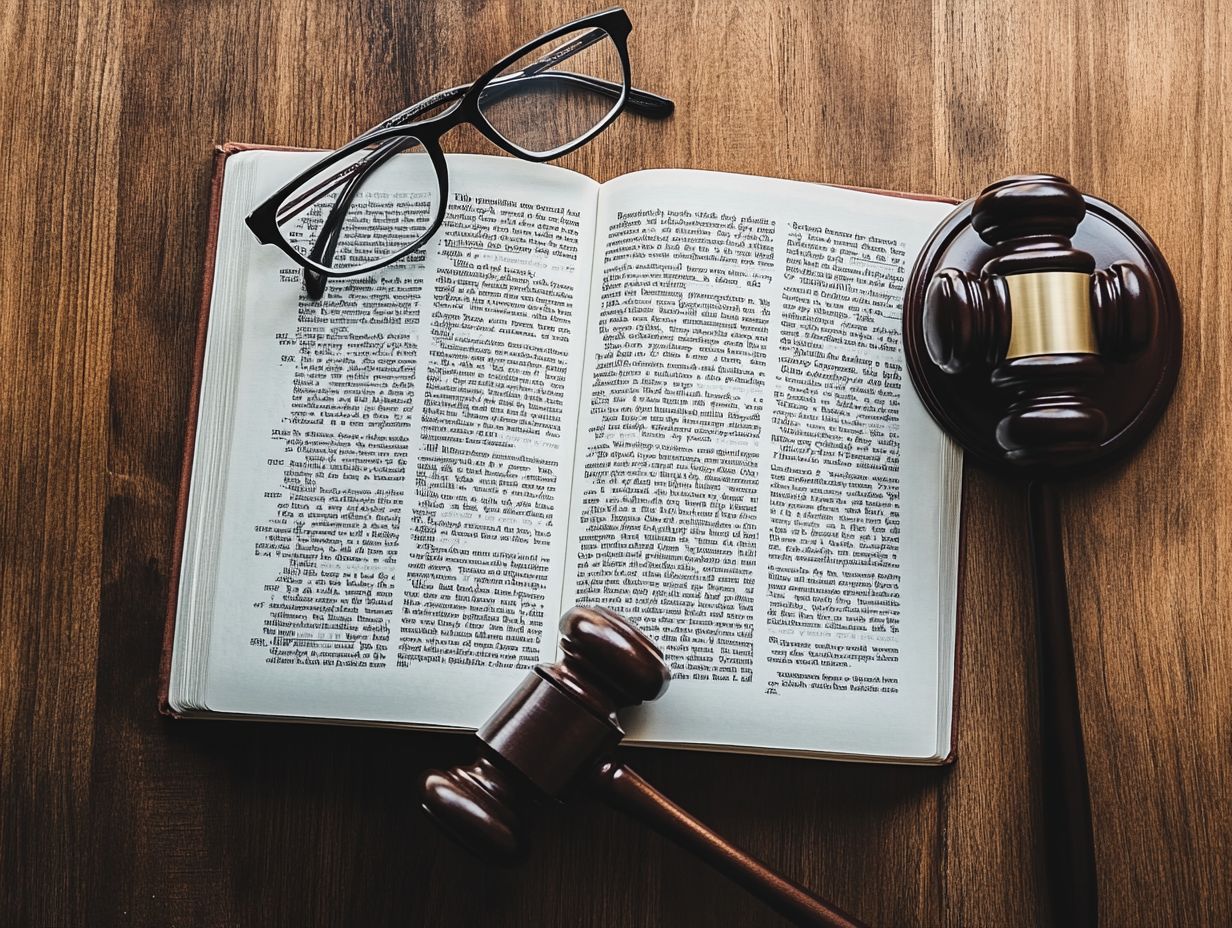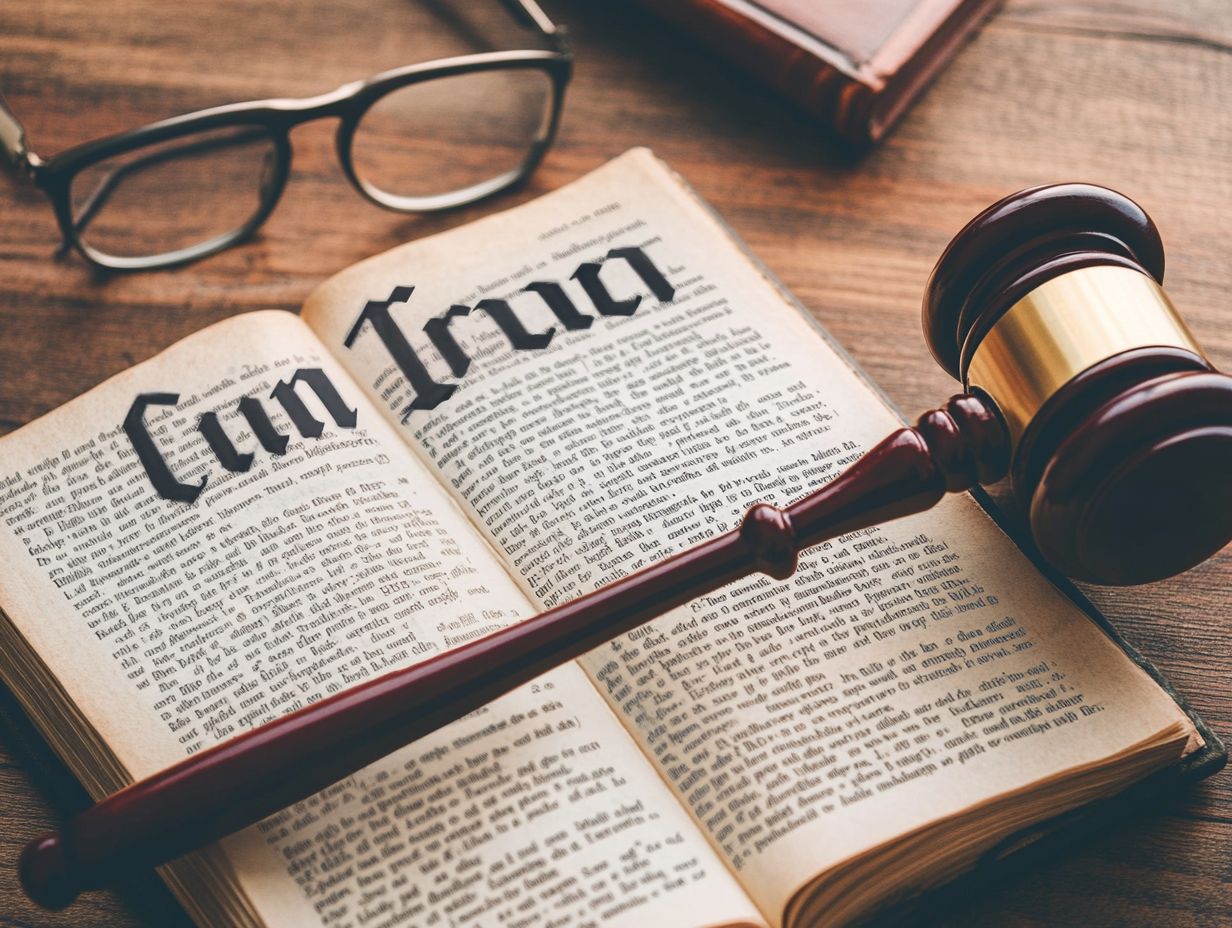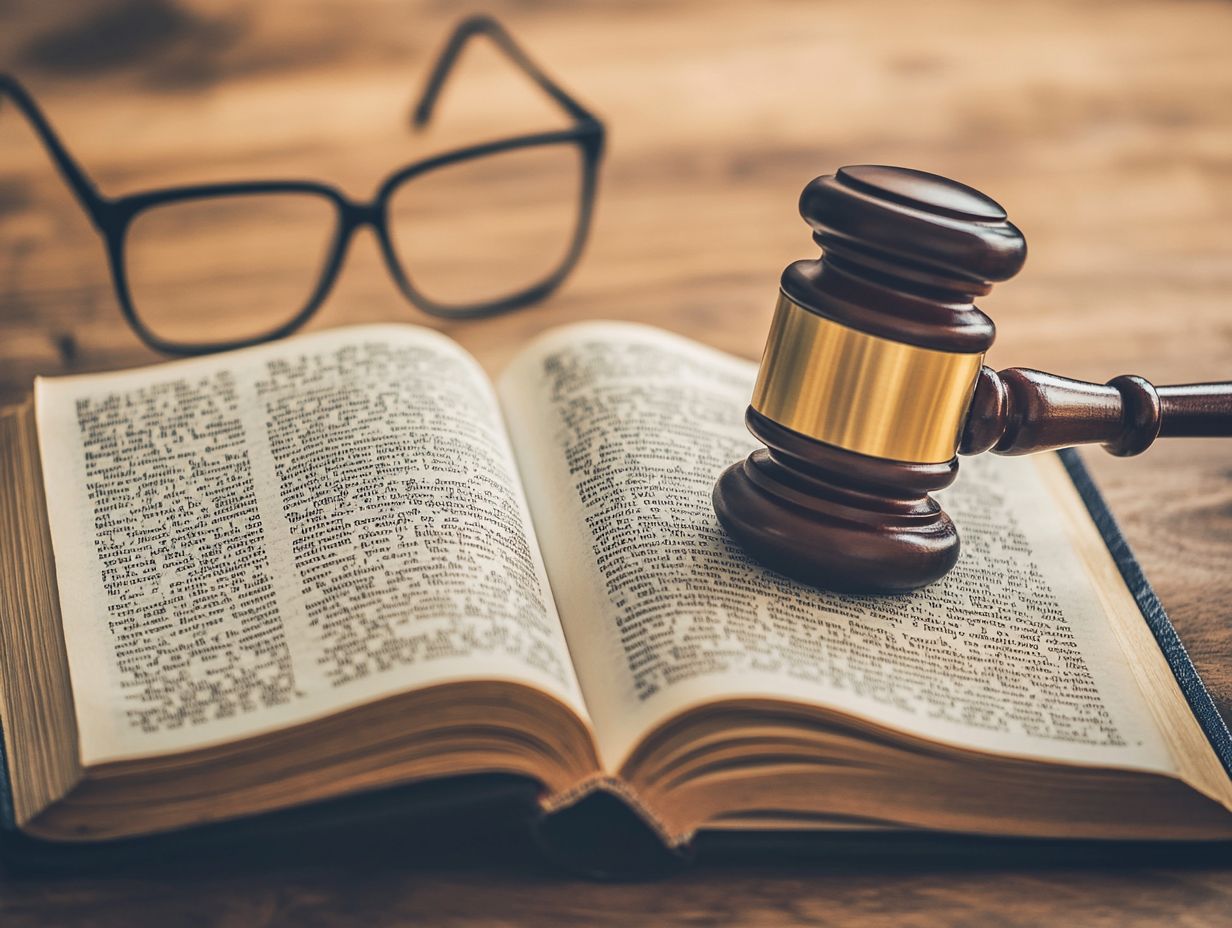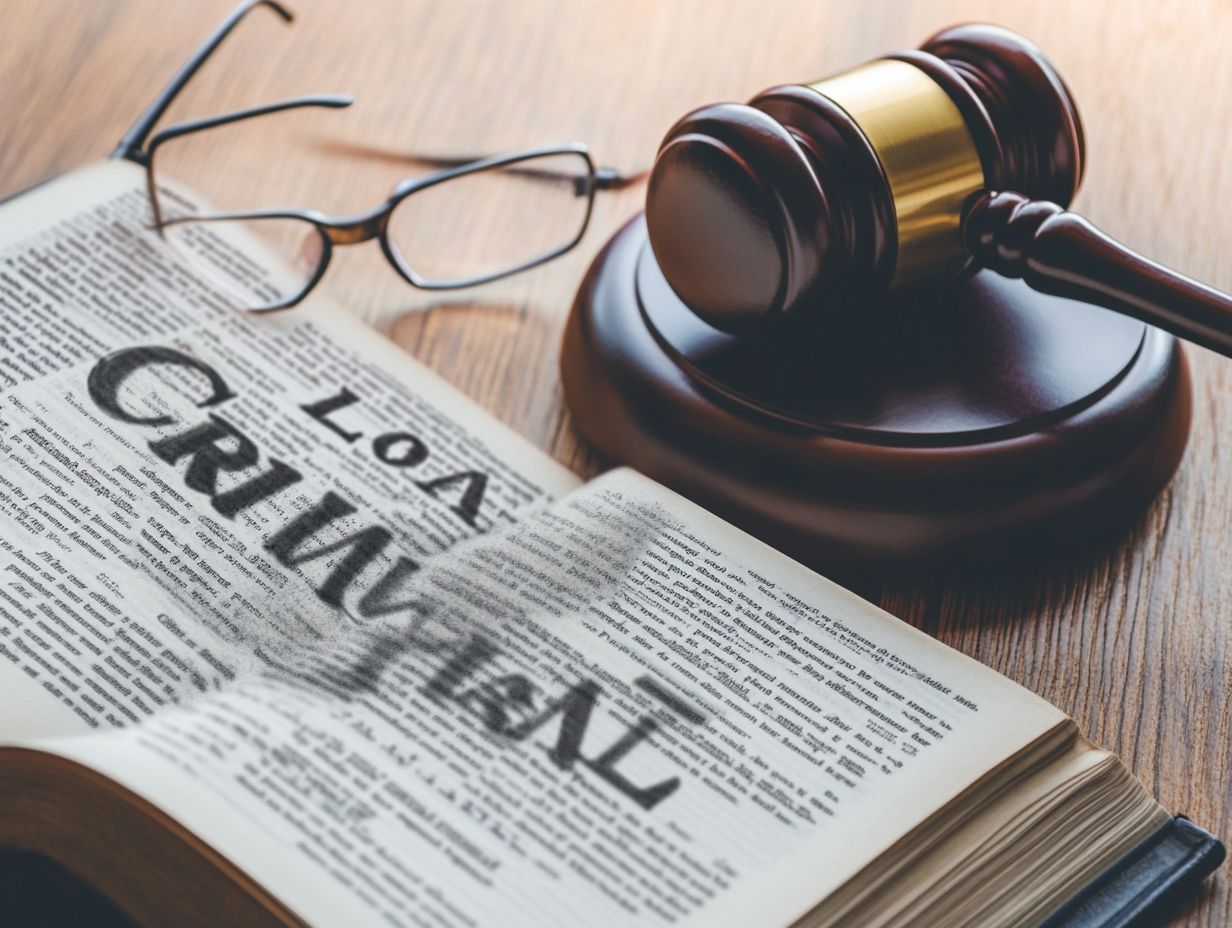How to Understand Criminal Law Terminology?
Navigating the complex world of criminal law can feel overwhelming, especially with its unique terminology and intricate concepts.
This article breaks down the essential aspects of criminal law, covering everything from the various types of crimes and their defining elements to common legal defenses and key procedures involved.
Whether you re a student, a professional, or simply curious about the legal system, you ll discover resources and insights that make the language of criminal law more accessible than ever.
Dive in to elevate your understanding!
Contents
- Key Takeaways:
- Defining Key Terms
- Types of Crimes
- Elements of a Crime
- Legal Defenses
- Legal Procedures and Terminology
- Resources for Understanding Criminal Law Terminology
- Frequently Asked Questions
- What is criminal law terminology?
- Why is it important to understand criminal law terminology?
- Where can I find a list of criminal law terminology?
- How can I improve my understanding of criminal law terminology?
- What are some common criminal law terms I should know?
- What should I do if I come across a term I do not understand?
Key Takeaways:

- Understand the different categories of crimes, such as violent, property, and white-collar crimes, to better comprehend criminal law terminology.
- Familiarize yourself with the elements of a crime, including the action of committing a crime and the mental state behind it, to fully grasp the legal definitions and implications.
- Utilize various resources, such as websites and books, to deepen your understanding of criminal law terminology and legal procedures.
Defining Key Terms
Defining key terms in the legal system is crucial for a clear understanding of court proceedings, particularly terms like acquittal, affidavit, and legal duty. These concepts are pivotal in the trial process of criminal cases.
Legal terms form the foundation for all interactions in the justice system, ultimately influencing trial outcomes and the rights of criminal defendants. A comprehensive grasp of these terms can significantly impact how you navigate the complexities of legal situations and safeguard your rights during court proceedings.
For example, an acquittal means you’re officially declared innocent, which can change your future by clearing your criminal record and restoring your reputation.
Meanwhile, an affidavit a written statement confirmed by oath often serves as crucial evidence that can bolster your position or statement in court. Understanding these terms not only gives you the power, but also helps you fulfill your legal duties, such as meeting court deadlines and presenting necessary documentation.
In essence, a firm grasp of legal jargon and its implications is vital for anyone involved in the justice system, ensuring you are well-equipped to assert your rights and obligations.
Types of Crimes
Crimes can be broadly categorized into felonies and misdemeanors, with each classification carrying its own set of legal consequences that mirror the severity of the charges.
Understanding these distinctions is vital whether you are a defendant or a plaintiff, as it aids in navigating the complexities of the legal system. This knowledge becomes particularly significant when considering the implications of specific offenses, such as domestic violence.
The legal principles that underpin these categories guide the processes involved during court proceedings, including aspects like indictment and requests for appeal.
Overview of Different Categories
An exploration into the various categories of crime unveils a spectrum of offenses, ranging from minor infractions to serious felonies. Each classification is determined by the severity of the act and its potential legal repercussions.
For individuals facing criminal charges, grasping these categories is essential, as they dictate the nature of the legal advice you ll need and the types of evidence that will be presented in court. This classification affects legal proceedings and shapes the strategies employed by both defense attorneys and prosecutors.
Crimes generally fall into two primary categories: felonies and misdemeanors, each carrying distinct implications.
Felonies are typically more serious, often involving significant harm to individuals or property, and can lead to lengthy prison sentences or hefty fines.
Misdemeanors, in contrast, encompass lesser offenses, such as petty theft or public intoxication, usually resulting in lighter penalties like short-term imprisonment or community service.
These distinctions are critical in legal contexts, as they determine the potential consequences for defendants and influence how courts prioritize different cases, ultimately impacting the broader legal process.
Empower yourself by exploring more about your legal rights today!
Elements of a Crime

The elements of a crime form the essential criteria that must be established to demonstrate the existence of a criminal offense, including intent, actions, and cause.
Grasping these elements is vital for both the prosecuting attorney and the defense lawyer in any criminal case. They inform the evaluation of evidence and the legal arguments put forth.
Each element requires robust support from legal authority within the framework of case law. This ultimately influences the outcomes of court proceedings.
Understanding the Components
Understanding the components of a criminal offense is crucial for grasping the legal principles that guide court proceedings. This spans from jury instructions to the assessment of the evidence presented.
These components include the underlying acts and intentions that form the basis of the offense. They must be clearly established to support either a conviction or a successful acquittal.
Legal practitioners often rely on previous court decisions to navigate these elements adeptly during trials.
Typically, each crime comprises two main components: the actus reus (the guilty act) and the mens rea (the guilty mind).
Take a theft case, for instance. It s not enough for the accused simply to have taken someone else’s property; they must also have intended to permanently deprive the owner of it.
The significance of corroborative evidence, such as witness testimonies or forensic findings, is crucial. These elements are vital in deciding the outcome of the prosecution’s claims.
Through these interactions, one can see how the presence and quality of evidence can influence a jury’s decision, ultimately shaping the trial’s outcome.
Legal Defenses
Legal defenses are pivotal in shaping the outcome of a criminal case. They offer arguments that can either exonerate you or lessen the impact of potential penalties.
These defenses can vary widely from self-defense to claims of insanity. Grasping their intricacies is vital for both defense attorneys and defendants alike.
In certain situations, you may find yourself negotiating a guilty plea as part of a plea bargain. In others, the option to file an appeal may emerge, driven by the legal strategies utilized during the trial.
Common Strategies for Defense
Common strategies for defense in a criminal case encompass a range of techniques designed to challenge the prosecution’s evidence. They also present mitigating circumstances that might lead to reduced charges or more lenient sentencing.
These strategies may involve questioning witness testimony, crafting alibi defenses, or exploring the complexities of legal advice. The effectiveness of these defenses often hinges on the discretion of the trial judge and the broader legal context surrounding the case.
For instance, leveraging witness testimony can greatly influence a jury’s perception. Credible witnesses who can vouch for your character or offer alternative narratives might prompt jurors to rethink the evidence laid out before them.
Grasping these legal nuances is vital and can make all the difference in your defense strategy!
When defense attorneys adeptly advocate for these considerations, it can lead to favorable trial outcomes. This sometimes results in reduced charges or even acquittals, underscoring the profound impact that strategic legal counsel can have within the criminal justice system.
Legal Procedures and Terminology

Legal procedures and terminology are essential components of the judicial system, shaping the course of court proceedings from the moment an indictment is filed until the trial judge renders a final verdict.
It’s crucial for you whether a defendant, plaintiff, or attorney to understand these processes as you navigate the complexities of the legal landscape.
A solid understanding of formal terminology think ‘written statement’ and ‘court administration’ can profoundly influence the effectiveness of your legal representation.
For more information or personalized legal advice, don’t hesitate to reach out to a qualified attorney!
Key Terms and Processes
Key terms and processes within the legal system include important words and steps that govern court actions, from filing legal documents to jury deliberations. Understanding these terms, such as “written argument” and “court processes,” is crucial for you as a legal practitioner or anyone involved in litigation.
Mastering this terminology facilitates smoother interactions within the legal framework and can lead to more favorable outcomes for both defendants and plaintiffs. Your comprehensive understanding begins with recognizing the significance of initial filings, which lay the groundwork for the entire case.
As litigation unfolds, key documents like complaints and answers outline the parties’ positions and legal arguments. Subsequent processes, such as discovery where evidence is exchanged play a pivotal role in shaping the case.
Grasping concepts like “burden of proof,” which is the responsibility to prove something in court, and “preponderance of evidence” can aid you in effectively presenting your case. Ultimately, being well-versed in these legal terms not only gives you power as an attorney but also enriches your clients’ knowledge, fostering enhanced cooperation and trust throughout the judicial process.
Resources for Understanding Criminal Law Terminology
Resources for understanding criminal law terminology abound and can greatly empower you to understand legal concepts. Whether you explore websites, delve into books, or seek advice from legal professionals, these tools offer foundational knowledge on the complexities of terms like ‘acquittal,’ ‘evidence presented,’ and ‘criminal offense.’
By engaging with these resources, you cultivate an informed perspective on the legal system and its intricate vocabulary, giving you the power to navigate its nuances with confidence.
Websites, Books, and Other Materials
Websites, books, and various materials are invaluable resources for those seeking to deepen their grasp of legal terminology and criminal law. They offer comprehensive insights into everything from court records to legal advice.
Popular legal websites often include glossaries of key terms, while books provide in-depth analyses and case studies that illuminate complex concepts. By utilizing these resources, you empower yourself to navigate the legal system with confidence.
Platforms like Nolo.com and FindLaw.com are critical tools, offering a wealth of articles, FAQs, and forums where you can pose questions about specific legal issues and glean wisdom from community discussions.
Texts like “Black’s Law Dictionary” are essential references for understanding legal language, providing definitions and context crucial for anyone involved in legal proceedings. Another notable gem is “Criminal Law: A Very Short Introduction,” which offers a concise overview of the key principles of criminal justice. Together, these resources clarify legal terminology and enhance your ability to make informed decisions in legal scenarios.
Frequently Asked Questions

What is criminal law terminology?
Criminal law terminology refers to the specific language and terms used in the legal system to describe crimes, legal procedures, and punishments. It is important to have a clear understanding of these terms to fully comprehend the criminal justice system.
Why is it important to understand criminal law terminology?
Understanding criminal law terminology is important because it allows individuals to fully understand their rights, legal proceedings, and possible consequences. It also helps individuals communicate effectively with legal professionals and navigate the legal system.
Where can I find a list of criminal law terminology?
A list of criminal law terminology can be found in legal dictionaries, law textbooks, and online legal resources. It is also helpful to consult with a legal professional for clarification and explanation of any terms that may be confusing.
How can I improve my understanding of criminal law terminology?
Start by getting to know the legal system and its procedures. Studying common legal terms and their definitions can also be very helpful.
Working with a legal professional or taking a criminal law course can significantly enhance your understanding.
What are some common criminal law terms I should know?
Common criminal law terms include:
- Felony: A serious crime.
- Misdemeanor: A less serious crime.
- Indictment: A formal charge or accusation.
- Arraignment: A court proceeding in which the accused is formally charged.
- Plea Bargain: An agreement between the defendant and prosecutor.
- Acquittal: A judgment that a person is not guilty.
- Sentencing: The determination of punishment for a convicted person.
Also, understand terms that relate to specific crimes, such as murder, theft, or assault.
What should I do if I come across a term I do not understand?
If you encounter a term you don’t understand, ask for clarification! Consult a legal professional, refer to legal resources, or do your own research.
It’s crucial to have a clear understanding of all the terms involved in your legal matters. Don’t hesitate to ask a lawyer for help if you encounter a confusing term!






